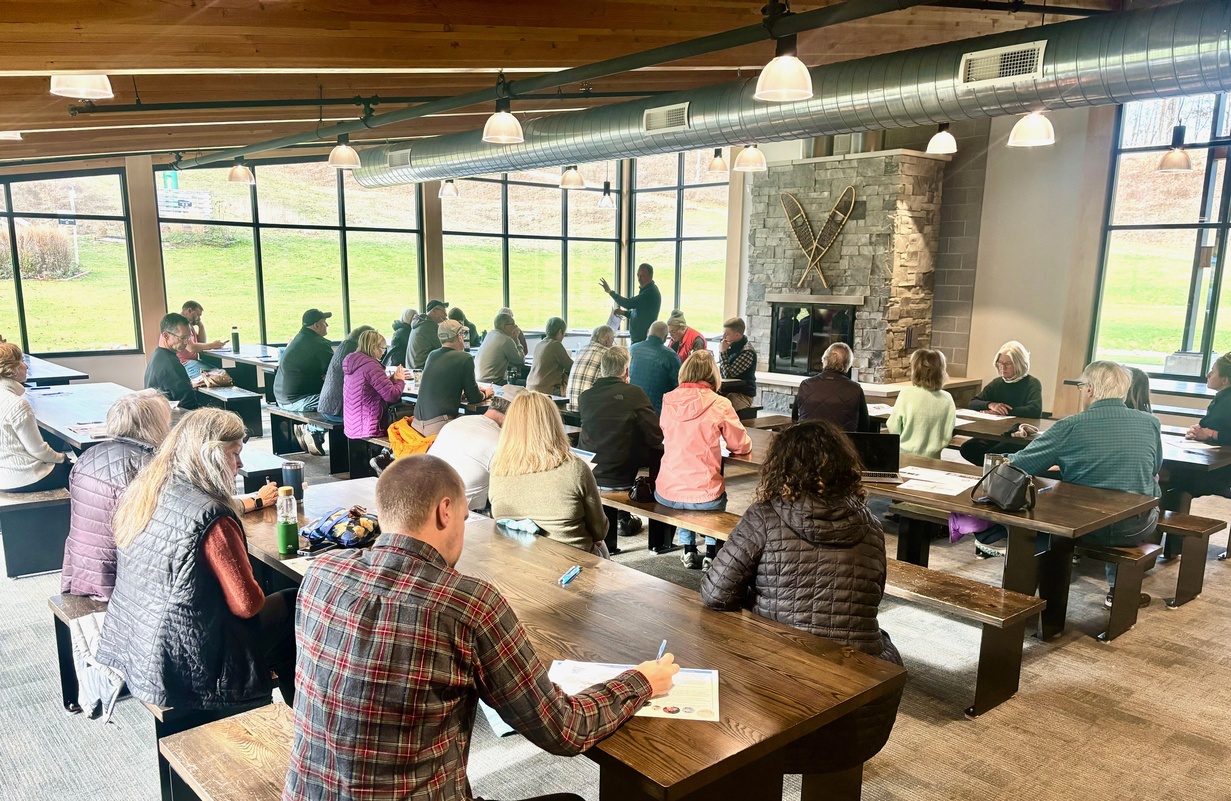
A Vision of Traverse City’s Future
By Beth Milligan | Nov. 14, 2024
Residents and neighborhood groups are participating in a series of public workshops this week aimed at answering a key question: What does the community want Traverse City to look like in the next decade?
Traverse City staff and consulting firm Future iQ are hosting the visioning sessions as part of the city’s process to create a new strategic action plan, which will look out to 2030 and “guide city programs and investments over the coming years,” according to the city’s website. Workshop participants are looking out slightly further – to 2035 – to consider various trends and scenarios that could impact Traverse City and give feedback on those they hope to embrace...or avoid.
Following two Think Tank sessions in October, the city is hosting six sessions this week at different locations and times of day to maximize participation. City neighborhood associations have been invited to attend specific sessions, but all are open to the public. Two sessions were held Tuesday at the NMC Great Lakes Campus and Governmental Center, with two more offered Wednesday at Hickory Hills. The final two sessions will be held today (Thursday) at 2:30pm and 4pm at the Traverse Area District Library’s McGuire Room. Sessions are approximately one hour long.
At a Hickory Hills session Wednesday, where approximately 40 people were in attendance, Future iQ CEO David Beurle began with open-ended questions about things participants were anxious or excited about regarding Traverse City’s future. Numerous attendees weighed in, primarily with concerns – including a lack of affordable housing, demographics being skewed toward retirees with not enough young workers and families, an escalating cost of living, and the potential loss of Traverse City’s small-town charm to rapid growth or tourism overexposure.
Some attendees cited positives – an abundance of natural resources, high-quality schools, good urban design, a strong library system, city services for residents like leaf pick-up and sidewalk clearing – and wanted to see those protected or enhanced. Others hoped to see better regional cooperation on planning, particularly between the city and Grand Traverse County.
Citing Park City, Utah as a possible cautionary tale – a tourist destination where many residents can no longer afford to live where they work – Beurle said Traverse City has a “big brand,” but added that means there are some “pretty tough decisions in front of you as a community.” He continued: “You’re a community that’s in the crosshairs of change, and that brings a lot of pressure.” Even more pressure could be coming if climate change refugees migrate from the southern to northern United States and the Great Lakes region is a target for its natural resources in the coming years, which is why it’s important for communities like Traverse City to plan for the future, Beurle said.
Beurle walked attendees through a matrix in which they could decide how proactive they wanted Traverse City to be in addressing development, growth, infrastructure, and regional planning – as well as more passive or reactive options, such as allowing the market to dictate growth or allowing the community fabric to naturally evolve over time without active intervention. That matrix produced four possible “scenarios of the future” for Traverse City, including:
Scenario A, Traverse City First: This scenario “forecasts a future where the community prioritizes goals internally and focuses less on regionalism. The community is economically focused on building demand for economic growth within the city itself, focusing on local businesses, entertainment options, and outdoor recreation.” Key tenets include: “focus on creating demand for living in Traverse City, view the future through a competitive lens, develop private public partnerships for housing development, create denser development along with mixed use neighborhoods, focus on establishing a four-year university within the city limits, (and) support local business growth.”
Scenario B, Equitable and Sustainable: This scenario “forecasts a future where the community recognizes the need to adapt and evolve as change occurs. The community commits to needed investments that enable it to be a future-ready community.” Key tenets include: “focus on creating demand for living in the region, view future opportunities and challenges through a regional lens, seek to influence regional trajectory through community values, support the inclusion of all voices in the decision-making process, continue to diversify the industry portfolio within the city and outlying areas, develop a year-round economy, (and) sees environmental protection and conservation as a means of economic strength.”
Scenario C, Balancing Act: This scenario “forecasts a future where the community leans into the regional approach and invests in building socio-economic systems but does so with the intention of remaining sensitive to market forces. Rather than guiding market demands through values-based processes to create desired outcomes, there remains a reactionary component to responding to market conditions.” Key tenets include: “focus is on growth while attending to social needs when possible, reactionary development captures short-term and medium-term gains, value-based growth models are prioritized less, regional ‘heft’ focuses on satisfying market conditions/reducing market drag, solutions to some social challenges may be delayed/not considered, (and )Traverse City may be viewed as ‘easier’ to do business with.”
Scenario D, Traverse City Anchors and Adapts: This scenario “forecasts a future where the community leans into the approach that is both local and market driven. The community is allowed to change organically and evolve as the conditions around it change.” Key tenets include: “focus is internal and locally competitive within the region, reactionary development is the primary guiding principle, social issues are addressed via market solutions or in pursuit of serving the market, Traverse City competes within its region to become economic critical mass, and adaptation is out of necessity, (and) short term/medium term gains are prioritized."
Beurle said all of the scenarios were “plausible,” noting that attendees at the October Think Tank sessions “could see these different futures potentially happening.” He noted that Scenario D seemed to draw the most pessimism from those attendees, who described it as a future where Traverse City could potentially “lose its way.” At the end of Wednesday’s session, Beurle collected rankings from participants (being collected at all of this week’s sessions) with the goal of compiling data to narrow down a preferred future scenario.
Next steps will include a community survey, which is expected to be distributed after Thanksgiving, and the publication of a portal that provides a visualization of the collected data. Work sessions and focus groups to develop city “strategic pillars” followed by another survey will lead to a draft strategic plan, time for public feedback, and the completion of the final plan. City commissioners are expected to receive the final plan in the second quarter of 2025, Beurle said.
Comment






